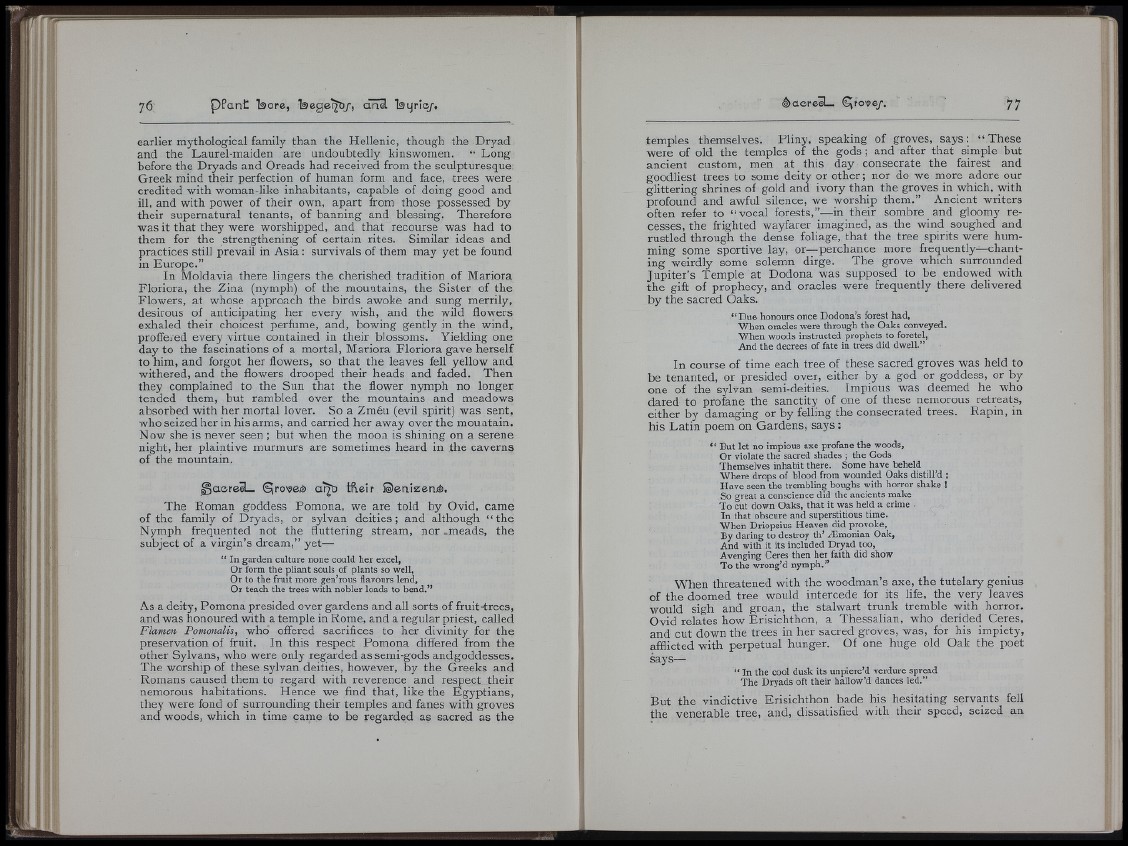
■i (■
1 ' ’
i i
l\ i 1!
7 6 p P a n t "bore, ‘b e g eq b /j cmi. l9L|ri<^,
earlier mythological family than the Hellenic, though the Dryad
and the Laurel-maiden are undoubtedly kinswomen. “ Long
before the Dryads and Oreads had received from the sculpturesque
Greek mind their perfection of human form and face, trees were
credited with woman-like inhabitants, capable of doing good and
ill, and with power of their own, apart from those possessed by
their supernatural tenants, of banning and blessing. Therefore
was it that they were worshipped, and that recourse was had to
them for the strengthening of certain rites. Similar ideas and
practices still prevail in A s ia : survivals of them may yet be found
in Europe.”
In Moldavia there lingers the cherished tradition of Mariora
Floriora, the Zina (nymph) of the mountains, the Sister of the
Flowers, at whose approach the birds awoke and sung merrily,
desirous of anticipating her every wish, and the wild flowers
exhaled their choicest perfume, and, bowing gently in the wind,
proffered every virtue contained in their blossoms. Yielding one
day to the fascinations of a mortal, Mariora Floriora gave herself
to him, and forgot her flowers, so that the leaves fell yellow and
withered, and the flowers drooped their heads and faded. Then
they complained to the Sun that the flower nymph no longer
tended them, but rambled over the mountains and meadows
absorbed with her mortal lover. So a Zmeu (evil spirit) was sent,
who seized her in his arms, and carried her away over the mou atain.
N ow she is never seen ; but when the mooxi is shining on a serene
night, her plaintive murmurs are sometimes heard in the caverns
of the mountain.
^ d c r e iL - tReli* ^ e n i z e n i ) .
The Roman goddess Pomona, we are told by Ovid, came
of the family of Dryads, or sylvan deities ; and although “ the
Nymph frequented not the fluttering stream, nor „.meads, the
subject of a virgin’s dream,” yet—
“ In garden culture none could her excel,
Or form the pliant souls of plants so well,
Or to the fruit more gen’rous flavours lend.
Or teach the trees with nobler loads to bend.”
As a deity, Pomona presided over gardens and all sorts of fruitfirees,
and was honoured with a temple in Rome, and a regular priest, called
Flamen Pomonalis, who offered sacrifices to her divinity for the
preservation of fruit. In this respect Pomona differed from the
other Sylvans, who were only regarded as semi-gods and goddesses.
The worship of these sylvan deities, however, by the Greeks and
Romans caused them to regard with reverence and respect their
nemorous habitations. Hence we find that, like the Egyptians,
they were fond of surrounding their temples and fanes with groves
and woods, which in time came to be regarded as sacred as the
(ilacfeiL. 77
temples themselves. Pliny, speaking of groves, says: “ These
were of old the temples of the gods; and after that simple but
ancient custom, men at this day consecrate the fairest and
goodliest trees to some deity or other; nor do we more adore our
glittering shrines of gold and ivory than the groves in which, with
profound and awful silence, we worship them.” Ancient writers
often refer to “ vocal forests,”—in their sombre _ and gloomy recesses,
the frighted wayfarer imagined, as the wind soughed and
rustled through the dense foliage, that the tree spirits were humming
some sportive lay, or—perchance more frequently—chanting
weirdly some solemn dirge. The grove which surrounded
Jupiter’s Temple at Dodona was supposed to be endowed with
the gift of prophecy, and oracles were frequently there delivered
by the sacred Oaks.
“ Due honours once Dodona’s forest had.
When oracles were through the Oaks conveyed.
When woods instructed prophets to foretel,
And the decrees of fate in trees did dwell.”
In course of time each tree of these sacred groves was held to
be tenanted, or presided over, either by a god or goddess, or by
one of the sylvan semi-deities. Impious was deemed he who
dared to profane the sanctity of one of these nemorous retreats,
either by damaging or by felling the consecrated trees. Rapin, in
his Latin poem on Gardens, says :
“ But let no impious axe profane the woods,
Or violate the sacred shades ; the Gods
Themselves inhabit there. Some have beheld
Where drops of blood from wounded Oaks distill’d ;
Have seen the trembling boughs with horror shake !
So great a conscience did the ancients make
To cut down Oaks, that it was held a crime
In that obscure and superstitious time.
When Driopeius Heaven did provoke,
By daring to destroy th’ riimonian Oak,
And with it its included Dryad too,
Avenging Ceres then her faith did show
To the wrong’d nymph.”
When threatened with the woodman’s axe, the tutelary genius
of the doomed tree would intercede for its life, the very leaves
would sigh and groan, the stalwart trunk tremble with horror.
Ovid relates how Erisichthon, a Thessalian, who derided Ceres,
and cut down the trees in her sacred groves, was, for his impiety,
afflicted with perpetual hunger. Of one huge old Oak the poet
says—
“ In the cool dusk its unpierc’d verdure spread
The Dryads oft their hallow’d dances led.”
But the vindictive Erisichthon bade his hesitating servants fell
the venerable tree, and, dissatisfied with their speed, seized an